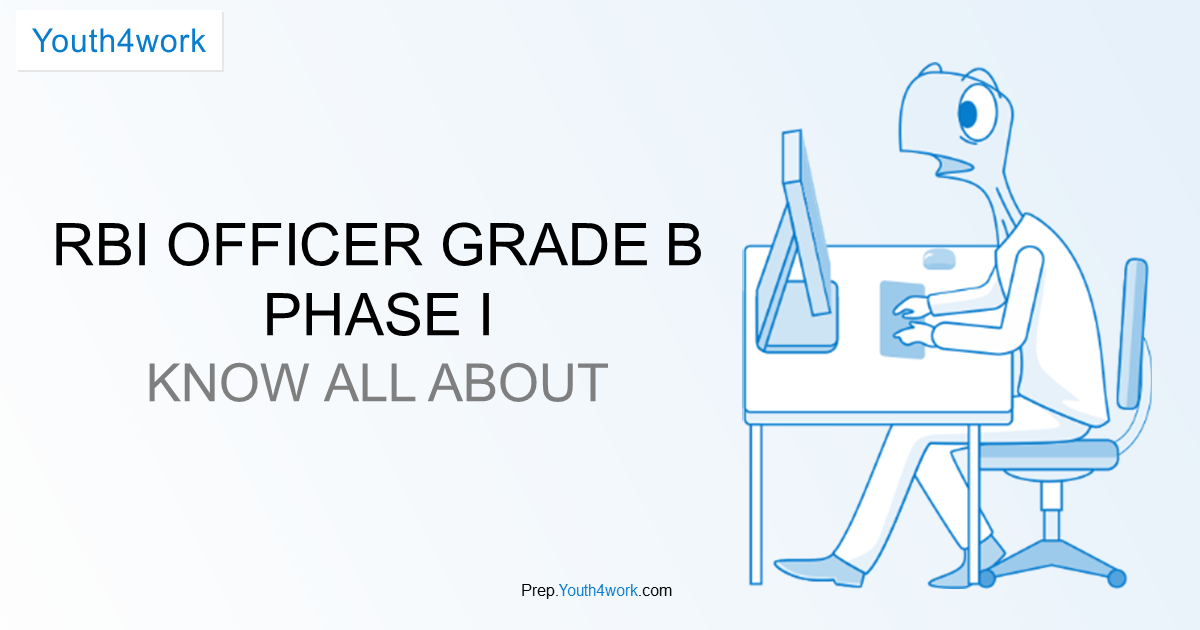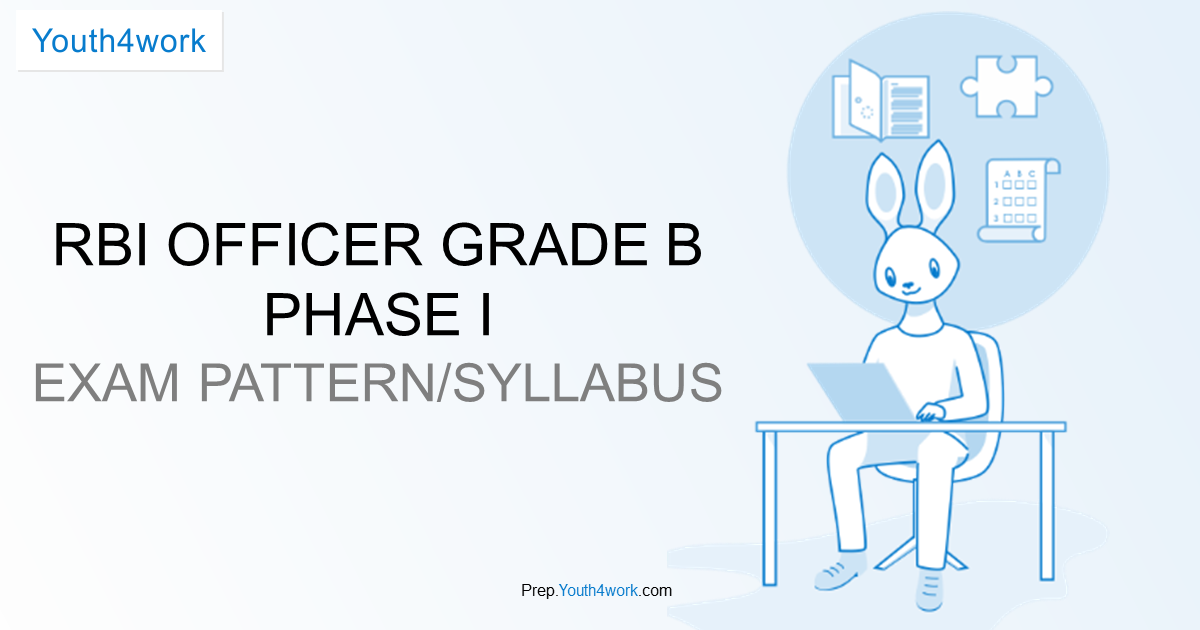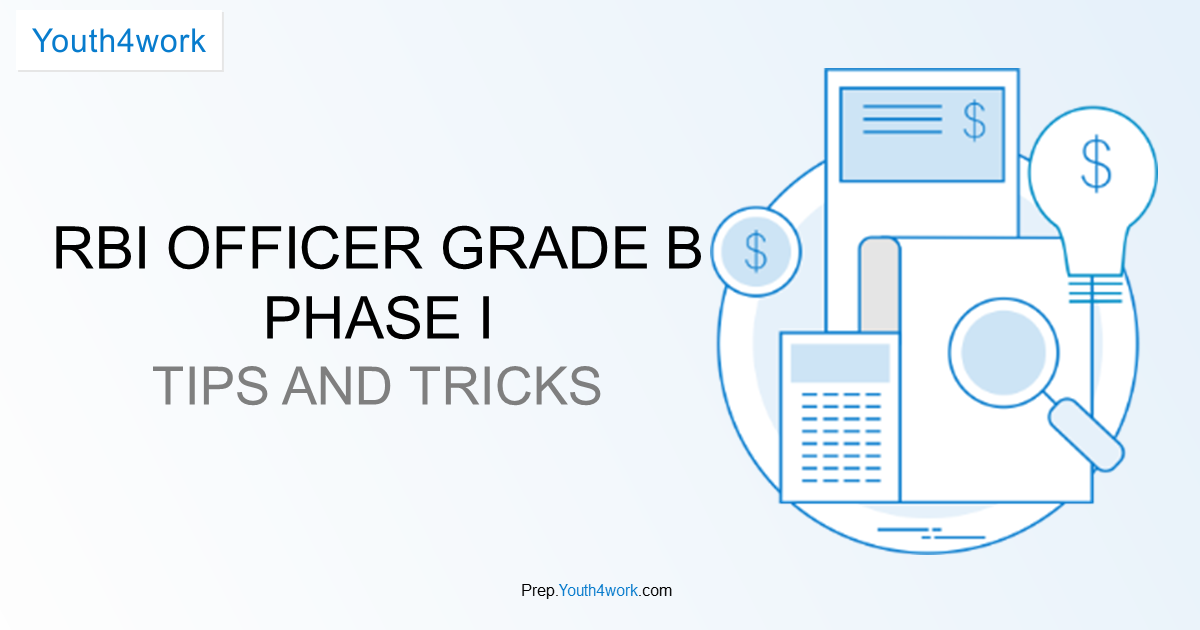RBI Grade B Phase 1 Officer Exam Pattern, Marking Scheme, Syllabus, Previous Year Papers
It has been decided by the Reserve Bank of India to introduce a new scheme of selection for recruitment of Officers in Grade- ‘B’ (DR), from the recruitment year 2015. Under the new selection method, the examination will be computer-based (Objective type with Multiple Choice Question pattern) and consists of two phases:
1. Phase-I
2. Phase-II
3. Interview
While Phase-I examination will continue as per the existing Phase-I examination for Grade- ‘B’ (DR), the Phase-II examination will consist of three papers, of which two will be compulsory papers and one optional paper. The age limit will be between 21 years to 30 years. For candidates possessing a Master's degree such as M.Phil. and Ph.D., the age limit is between 32 years to 34 years. The candidate is eligible to apply if he/she is either a citizen of India or a subject of Nepal or Bhutan. Important Note: The number of Attempts is restricted only for General Category Candidates. They cannot apply if they have already appeared earlier at least six times for Phase-I Examination.
Eligibility | Syllabus | Exam Pattern |
मुख्य हाइलाइट
Rbi Officers Grade B Phase I का
What is RBI Grade B Officers Selection Procedure?
The Reserve Bank of India has changed the recruitment pattern for the Officers in Grade-B position since 2015. The candidates will find the selection procedure divided into three stages: Phase-I, Phase-II, and then the final interview. Let’s clarify how you will proceed with the recruitment procedure for the RBI Grade B Officer position.
1. RBI Grade B Phase-I
The first stage is the Phase-I recruitment exam, where the participants will have to appear for the online examination, and the candidates can score a maximum of 200 marks in this phase.
2. RBI Grade B Phase-II
The candidates have to appear for three papers, each for 100 marks, where the candidate will test based on the writing skills, economic and social issues, and the context of finance/management/economics or statistics.
3. Interview
After clearing the phase-I and phase-II, the candidates are called for the final interview. The recruitment authorities will contact the selected candidates through the mail, personal message via registered numbers. RBI will interview at the branch offices.
RBI is the topmost organization in the field of Banking in India. It regulates all the Banks and holds the hand over any decision related to the Banking field. Getting into RBI is just like a dream come true; there are various positions for recruitment. Here is the stair for the graduates who have plans of getting into the organization.
While appearing for any exam, the important things that any candidate majorly looks for are the exam pattern, marking scheme, syllabi, eligibility criteria, exam fees, and the most crucial aspect for any exam is the dates for the particular exam. Do not worry; we will cover you for every part of the RBI Grade B Officers Recruitment Exam.
Let’s see what the RBI Grade B Officer’s Exam Pattern is:
What does the exam pattern comprise of? Let's dive into the pattern to understand it and make a proper strategy to shine with bright numbers in the recruitment exam. As we have seen earlier, the candidate has to undergo three selection tests, and the first two selection tests are online.
RBI reserves all the rights of altering anything regarding the RBI Grade B Officers Recruitment Exam. The candidates will find all the details concerned to the recruitment exam; for the simpler version of the RBI Grade B Officer Exam Pattern, it is available in the tabular form:
|
Exam Name |
RBI Officer Grade B Recruitment Exam |
|
Exam Conducting Authority |
RBI |
|
Type of Exam |
Recruitment Exam |
|
RBI Grade B Recruitment Procedure |
1. RBI Grade B Phase-I 2. RBI Grade B Phase-II 3. Interview |
|
RBI Grade B Test Mode |
Online, Computer-Based Test |
|
Type of Questions |
Objective, Multiple-Choice Questions |
|
RBI Grade B Exam Duration |
Phase-I: 2 Hours Phase-II: 3 Papers for 1.5 Hours |
|
RBI Grade B Exam Marks |
Phase-I: 200 Marks Phase-II: 300 Marks Interview: 50 Marks |
|
Number of Attempts applicable |
6 (Unreserved category applicants) |
Key Points of the RBI Officers Grade B Exam Pattern:
-
The candidate will have both objective and descriptive exam for the selection in the online mode. The exam's first phase will test the candidates based on reasoning skills, general awareness, quantitative aptitude, and the English Language.
-
In the second phase of the RBI Officers Grade B Exam, the candidate has to give three papers and give their best in English Language, Economic and Social issues test.
-
The exam duration of Phase 1 is 120 minutes, and Phase 2 is 90 minutes for each paper.
-
There is an optional paper in the Phase-2 exam in which the options are Finance and Management, Economics, Statistics. The candidate has to opt for one section for the Phase-2 exam.
Check RBI Officers Grade B Phase-I Exam:
The Phase-I exam is the objective-type; the questions are in MCQ format. The time frame for the phase-I exam is 120 Minutes. The objective-type questions are from 4 sections, Reasoning, General Awareness, Quantitative Aptitude, English language.
|
S.No. |
Section Name |
Questions from this section |
Marks allotted |
|
1. |
Reasoning |
60 |
60 |
|
2. |
General Awareness |
80 |
80 |
|
3. |
Quantitative Aptitude |
30 |
30 |
|
4. |
English Language |
30 |
30 |
|
Total Questions: Total marks: |
200 200 |
||
When you have a clear image of the exam pattern, the next step is to look out for the exam's syllabi. The main concern of any candidate appearing for the examination is to excel it with shining numbers, for that the topics play an important role. The chapter-wise distribution of the first phase is here:
Reasoning |
Quantitative Aptitude |
General Awareness |
English Language |
|
|
Upstream and Downstream |
||||
|
Static General Knowledge |
||||
|
Simplification |
Quadratic Equations |
Government Schemes |
||
|
Number Series |
Sports |
Idioms and Phrases |
||
|
Simple and Compound Interest |
Inequalities |
Books and Authors |
Vocabulary |
|
|
Input-Output |
Mensuration |
Awards and Honors |
ClozeTest |
|
|
Analogy |
Profit and Loss |
Data Interpretation |
National and International News |
Sentence Rearrangement |
Check RBI Officers Grade B Phase-II:
The Phase-II Exam is objective-type except the English Language Test that tests the candidate based on writing skills. Phase-II is divided into three papers, Paper-I, Paper-II, and Paper III. The time frame for the phase-II exam is 90 minutes.
|
S.No. |
Section Name |
Type of Questions |
Marks allotted |
|
1. |
English Language |
Descriptive |
100 |
|
2. |
Economics and Social Issues |
Objective |
100 |
|
3. |
Optional Paper (Finance and Management/ Economics/ Statistics) |
Objective |
100 |
|
Total marks: |
300 |
||
For the Phase-II exam, the candidate has to clear the Phase-I exam with the minimum cut-off marks. The candidate will then only be eligible for the Phase-II recruitment exam. The chapter-wise distribution of topics for the three papers are here:
1. English language
2. Economic and Social issues
3. The optional paper with subjects- Finance and Management/ Economics/ Statistics
-
English Language Test will test the candidate's writing skills as this is a descriptive paper with all the answers to be written using the keyboard.
-
The topics relevant for RBI Officers Grade B Phase-II Examination are here; check the Mock Tests that will enable you to get into the ride for knowledge.
|
Economic and Social Issues |
|||
|
Growth and Development |
Role of Economic Planning |
Demographic Trends |
Social Sectors in India |
|
Poverty Alleviation and Employment Generation in India |
Globalization |
Urbanization and Migration |
Health and Education |
|
Sustainable Development and Environmental issues |
Export-Import Policy |
Gender Issues |
Positive Discrimination in favor of the underprivileged |
|
Economic Reforms in India |
International Economic Institutions |
Social Justice |
Regional Economic Cooperation |
|
Industrial and Labour Policy |
IMF and World Bank – WTO |
Social Movements |
Privatization |
|
Monetary and Fiscal Policy |
Social Structure in India- Multiculturalism |
Indian Political System |
Human Development |
In the three papers of 100 marks each, the third paper is Optional Paper, where the options are Finance and Management, Economics, and Statistics. The candidate has to choose among the three options and proceed further for the examination. The chapter-wise topics for the three subjects are here:
|
Optional Papers: Finance and Management/ Economics/ Statistics |
|||
|
Finance |
Management |
Economics |
Statistics |
|
Regulators of Banks and Financial Institutions |
Management Processes |
Microeconomics, Consumers behavior, and firms |
Probability, Numerical Analysis |
|
RBI, Banking System in India, SIDBI, EXIM, NABARD, NHB |
Staffing, Directing and Controlling |
Markets-monopoly, General Equilibrium of price and activity |
Statistical Methods |
|
Primary and Secondary Market |
Role of a Manager in an Organisation |
Macroeconomics, national income, and its components |
Linear Models |
|
Risk Management in Banking Sector |
Leadership, Leadership Styles, Leadership Theories |
Major macro-economic school of thoughts, Classical, Keynesian and Monetarist |
Statistical Inference |
|
Portfolio Investment, Public Sector Reforms, Disinvestments |
Human Resource Development, Concept of HRD; Goals of HRD |
Consumption and Investment demand, Money demand and supply |
Multivariate Analysis |
|
private and social cost-benefit, PublicPrivate Partnership |
Potential appraisal and development |
The benefit of International Trade, International finance, and exchange rates issues in an open economy |
Optimization Techniques and Statistical Quality Control |
|
Direct and Indirect taxes; Non-tax sources of Revenue, GST, Thirteenth Finance Commission and GST |
Career Planning, Training and Development, Employee Welfare, Motivation |
Public Goods, instruments of financing, government tax, and non-tax revenue |
Sample Surveys and Design of Experiments |
|
Finance Commission, Fiscal Policy, Fiscal Responsibility and Budget Management Act (FRBM) |
Theories of Motivation; How Managers Motivate; Concept of Morale |
Government expenditure policy-various components, Direct and Indirect taxes |
Applied Economic Statistics |
|
Inflation: Definition, trends, estimates, consequences, and remedies (control): WPI, CPI |
Communication, Barriers to Communication, Role of Information Technology. Corporate Governance |
India’s Economy and Development Issues, Agriculture, Financial sector regulation, fiscal policy and the changing priorities of the government |
Vital Statistics, Basic Computer Applications |
How to Excel RBI Officer Grade B Exam:
Before appearing the exam, the candidates always look out for the minute things that will help in clearing the exam with bright numbers. Here are some of the tips and tricks for the RBI Officers Grade B Phase-I and Phase-II Recruitment Exam:
-
Take Y4W RBI Grade B Mock Tests to grab the hold on the examination. The test will help you foresee the examination difficulty, take the mock test seriously, and don’t get demotivated if your score is less.
-
The Previous Year Exam is the best way to get a glimpse of the examination; check out five last year RBI Grade B Exam Papers. It will help you in understanding the exam pattern, syllabus, majorly asked topics n the examination.
-
The negative marking is a significant factor in the exam; mark all the answers carefully as it will create a considerable margin between the cut-off and your earned marks.
-
RBI has released a series of suggested books for each subject, so go through with the online portals and refer to the study material for the best results.
-
English Language has a significant hold in both Phase-I and Phase-II; it is best for the candidates to prepare for the section well. Phase-II English test will focus on testing the writing skills.
-
There will be 200 questions in RBI OFFICER GRADE B PHASE I; try to manage time.
-
Prepare from starting; don’t leave it for the last day, as hurriedness kills everything.
-
Read all the instructions before going for examinations.
Eligibility:
Educational Qualification and Age Limit
The candidate must have possessed Graduation Degree with 60% marks in any discipline from a recognized University/Board. The age limit is between 21 years to 30 years. For candidates possessing Master's degree such as M.Phil. and Ph.D., age limit is between 32 years to 34 years.
Youth4work Prep Tests
Online practice tests for competitive exams – are very unique and popular among aspirants. Aspirants can take self-designed mock-tests as well as practice for sections and topics separately. Youth4work’s unique and proprietary technology is helping lakhs of aspirants to reveal personal details on what are the strength areas of aspirants for any exam and also suggest how they can improve the performance.
Following are interesting insights from nearly lakhs of question attempts on RBI OFFICER GRADE B PHASE I exam practice tests on Youth4work. Every aspirant is rated on a Rating Scale. The ratings of the aspirants change with every question attempt.
चर्चा मंच
समान प्रतिभा वाले युवक/युवती इस प्रश्न का शीघ्र उत्तर देंगे।












